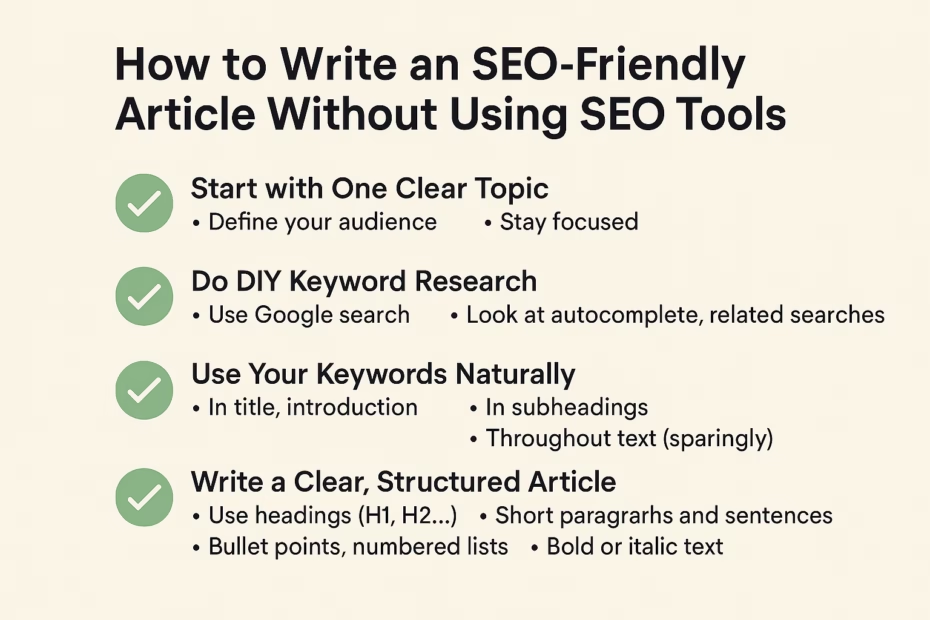How to Write an SEO-Friendly Article Without Using SEO Tools
Think you need fancy SEO tools to write a search-optimized article? Write an SEO-Friendly Article Without Tools
Think again. While tools like Ahrefs and Semrush are great, they’re not essential. You can still write high-quality, SEO-friendly content that ranks — even with zero tools in your arsenal.
In this guide, I’ll show you how to do it the old-school, smart way.
🎯 1. Start with One Clear Topic (Don’t Overthink It)
Before you type a single word, ask yourself:
- What is this article about?
- Who is it for?
Let’s say you want to write about making iced coffee at home. Don’t try to squeeze in “best coffee grinders” or “how to clean your coffee maker” — those are different posts.
Stay focused. Google loves relevance.
🔍 2. Do DIY Keyword Research (Yes, It’s Possible)
You don’t need a paid tool to find useful keywords. Here’s how to do it with Google alone:
Try This:
- Go to Google and type your topic (e.g., “how to make iced coffee”)
- Look at:
- The autocomplete suggestions
- The “People also ask” section
- Related searches at the bottom of the page
Write down any common phrases or questions you see — those are your keyword opportunities.
💡 Tip: If you notice a lot of people searching for “iced coffee with milk” or “without a machine,” consider including those variations too.
🏗️ 3. Use Your Keywords Naturally — Like a Human
Once you’ve found a few relevant keywords:
- Put the main one in your title
- Mention it early in your introduction
- Use it occasionally in subheadings and the body
- Avoid stuffing — Google’s not a fan, and readers can smell it
Write like you’re talking to a friend. That’s the secret.
📚 4. Structure Your Article for Readability
Google and your readers love well-structured content. Use:
- Headings (H2, H3) to break up sections
- Short paragraphs (2–4 lines)
- Bullet points and numbered lists
- Bold text to highlight key info
If your post is easy to skim, it’s easier to love — and easier to rank.
🔗 5. Link Smartly: Internal + External
Internal Links:
Link to your own related articles (if you have any). This keeps people on your site longer and helps search engines understand your content.
External Links:
Link to helpful, trustworthy sources — like Wikipedia, government sites, or credible blogs. Just don’t overdo it.
📸 6. Add Images with Descriptions
A picture really is worth a thousand clicks. Add:
- Relevant images (original photos, screenshots, or royalty-free)
- Alt text that briefly describes each image
Alt text helps with image SEO and accessibility.
🗣️ 7. Write for Humans First, Algorithms Second
Google’s algorithm is smart, but your reader is smarter. If your content solves a real problem in a clear, engaging way, you’re doing SEO right — even without tools.
Don’t write like this:
“The best iced coffee is the iced coffee that is made best…”
Write like this:
“Want great iced coffee without leaving your house? You’re in the right place.”
✅ 8. Check the Basics Before You Publish
Before hitting “Publish,” run through this quick checklist:
- ✅ Title includes your main keyword
- ✅ First paragraph introduces the topic clearly
- ✅ Headings break things up logically
- ✅ Links are included (internal + external)
- ✅ Images are optimized with alt text
- ✅ Your article is swimmable, clear, and helpful
That’s real SEO.
📣 9. Wrap It Up with a Call to Action
At the end of your post, encourage your reader to:
- Comment with a question
- Try something you recommended
- Share your post with others
Engagement helps with SEO too. Plus, it builds trust.
🔚 Final Thoughts
You don’t need fancy SEO tools to create content that ranks. All you need is a little strategy, some basic research, and a genuine desire to help your reader.
Stay focused, write naturally, and always aim to solve a real problem — that’s SEO, even without the software.
If this article was helpful to you, please leave your feedback in the comment section below.
Read Another Article: Google Shares Viral Prompt Engineering Paper


